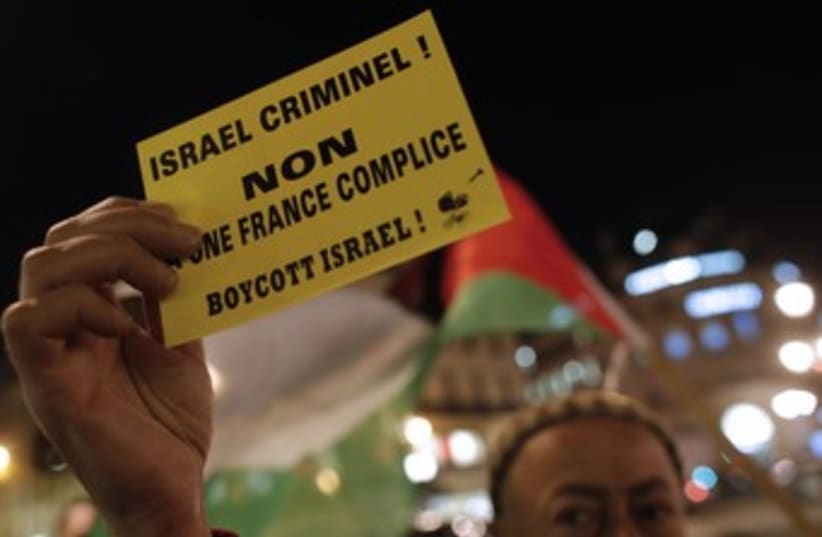The article was excitingly described in Rabbi Lookstein’s comments as both “interesting – and disturbing.”
It seems to have struck a nerve in the Jewish community in its concern over the BDS movement. The BDS debate is taking place largely among Ashkenazi Jewish activists – Zionist and anti-Zionist. Trying to link it to the Arab Jewish question is, as I shall be arguing, less than helpful. BDS remains very much a battle among Ashkenazi Jews over control of Jewish identity and the bitterly contentious discourse it has engendered.
Given the dearth of Arab Jewish voices in the media, it is sad to note that Ms. Lagnado, like André Aciman, another angry Egyptian Jew who has become prominent in the larger discourse, has chosen to turn her back on her cultural heritage and act the part of a typical paranoid Ashkenazi Jew of the New York City variety rather than remain loyal to the rich cultural heritage of Middle Eastern Judaism.
Of course the matter is rooted in her distorted understanding of the Egyptian-Jewish experience and its illustrious history from Philo of Alexandria to Edmond Jabes.
What we see in the article is the usual lachrymose sense of Arabs and Jews that is connected to the Zionist mission. The argument in the article is ostensibly premised on her identity as an Egyptian Jew and what that identity means in socio-historical terms.
But the discussion lacks any real sense of historical context.
We do not see in the article any actual presentation of the tense relations between Israel and the Arab world in the post-1948 period that would give some context to what the article characterizes of Egypt’s Jews as having been “mistreated and denied our homelands.”
There is no discussion of Ben-Gurion and Nasser’s dysfunctional relationship and the Israeli leader’s belligerent refusal to seek a peaceful resolution with Egypt and other Arab countries that has served to perpetuate the conflict for many decades; a matter that has been amply discussed by the Iraqi-Jewish historian Avi Shlaim in his book The Iron Wall.
Tellingly, there is no mention of the so-called “Lavon Affair” in which the Israeli government engaged native Egyptian Jews as spies for a bombing mission that targeted prominent sites in the country.
It was a mission that ended in disaster for the participants who were tried and convicted and executed by the Nasser government, eventually leading to the collapse of Ben Gurion’s government after the scandalous details of the failed mission were disclosed in the press.
The article also conveniently avoids discussing the larger problem of Arab Jewish culture and representation in both the American Jewish community and Israel.
More than this, there is no mention of the hardships and persecution that Arab Jews faced when they arrived in Israel. To the contrary, anti-Sephardi racism is magically transformed into praise of Israel for so warmly opening its arms to those fleeing the Arab-Muslim world after 1948. No mention of what lay ahead for those who came to this new and forbidding Ashkenazi land.
The matter of anti-Sephardi racism remains an issue to this very day for those who still happen to pay attention to such things.
We do not see the Lagnado article mention the Cairo Geniza or the legacy of the great rabbis and intellectuals in the Egyptian-Jewish tradition in a way that would provide context and nuance in the discussion.
The names of two great Egyptian Jews, the brilliant polymath Rabbi Haim Nahum Effendi and the militant Egyptian nationalist James Sanua are not presented in the article’s litany of bitter antagonisms.
Indeed, we do not even hear about the great writer Jacqueline Shohet Kahanoff and her theory of Levantinism.
Recently, Joyce Zonana has discussed the seminal writing of this important Egyptian-Jewish literary figure, barely known in Jewish circles.
Given these cultural and historical omissions, it is hard to really process the full reality of the Egyptian-Jewish experience and the role it plays in the Zionist question. The article does not address the matter of Egyptian Jewry with any precision.
Situated in an Ashkenazi-dominated Jewish world, Ms. Lagnado has chosen to adopt many of its values and to speak in a language that is consistent with its worldview. Her writings are steeped in Ashkenazi views of Judaism and Jewish history. The positions that she takes will likely be used by many Ashkenazim as a reflection of the Arab Jewish view when in reality there is no real authenticity in the argument.
The suppression of Arab Jewish voices in the Jewish community and in the general media landscape is confirmed when we see the way in which our history is so often deployed at the service of Ashkenazi values that have so brutally undermined the integrity of our cultural heritage.
It is, once again, an example of Arab Jews transforming themselves and their cultural heritage in order to dutifully serve the interests of those who would see us removed from the Jewish discourse. Speaking out of ignorance is no way to make an argument.
The discussion of the BDS movement is merely a smokescreen that seeks to obscure the writer’s deep-seated anomie and repugnance for the Arab Jewish heritage that currently permeates our community and has sadly created a fierce sense of self-loathing among its members.
David Shasha is the founder and director of the Center for Sephardic Heritage in Brooklyn, New York designed to raise awareness of the history and culture of Arab Jews. He publishes the Sephardic Heritage Update, a weekly e-mail newsletter available on Google Groups. He has written for publications such as the Huffington Post, Tikkun magazine, The Progressive Christian, and The American Muslim. You can contact him at david.shasha.shu@gmail.com
